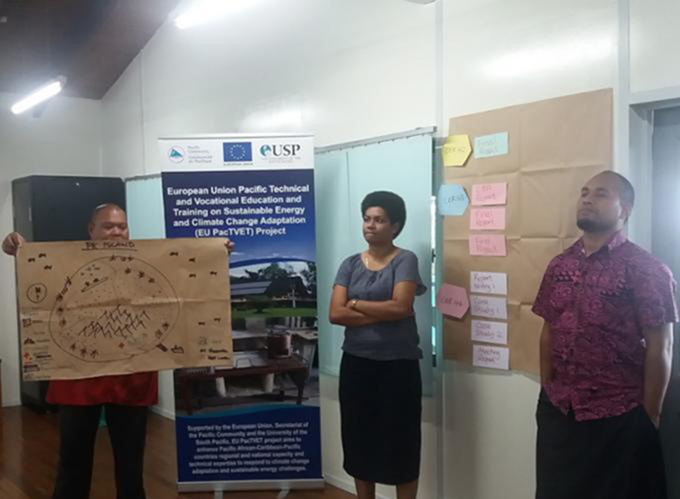
Pacific Media Centre Newsdesk
Twenty four students attended face-to-face training sessions in Suva last week as the final step of an intensive 16-week training programme on climate change adaptation and disaster risk reduction.
The successful students will be awarded the regionally recognised Certificate IV in Resilience, giving the Pacific an expanded pool of regional expertise in this field, reports the Secretariat of the Pacific Community (SPC).
The training programme, which included students from Fiji, Kiribati, Nauru, Samoa, Tonga and Vanuatu, is part of the European Union-funded Pacific Technical and Vocational Education and Training in Sustainable Energy and Climate Change Adaptation (EU PacTVET) project, implemented by the Pacific Community (SPC) in partnership with the University of the South Pacific (USP).
Funding for the programme was provided by the EU PacTVET project and delivered by the USP Pacific Technical and Further Education (Pacific TAFE) programme. Funding included tuition for Fiji-based students, accommodation and travel for regional students for the face-to-face sessions in Fiji.
The training programme consists of 14 weeks of online course work, a one-week study break and a final week of face-to-face sessions.
During the online sessions, students were trained on hazard identification and risk assessment, institutional frameworks and cost benefit analysis in resilience and workplace communications.
In addition to the Certificate IV in Resilience work, about half of the students in this first group completed the Certificate IV in Training and Assessment offered at the USP Pacific TAFE, which was funded by the EU PacTVET project.
‘Training the trainers’
A smaller group took part in “training of trainers” programmes offered at other institutions.
At the opening of the face-to-face sessions Dr Brad Carte, head of the College of Science, Technology and Environment at the USP Pacific TAFE emphasised that, “this is only the first step in increasing the local resilience capacity and expertise in the Pacific.
“Our vision is to create a larger group of certified trainers for Certificate 3 and 4 in Resilience for the region.”
Speaking on behalf of the EU PacTVET project, Dr Helene Jacot Des Combes said: “With this training you will be active ambassadors of resilience in the region.
“With the Certificate 4 in Resilience, you should be able to, in the short term, help your people back home to prepare for disasters and, in the long term, help them prepare for climate change.”
According to student Tevita Fakaosi from Tonga, “competency-based assessment is one thing I have learned where you provide evidence that you can do a particular task in a given situation/context. This will be useful when conducting training with the communities that I work with.”
Emergency resilience
Tomasi Tuilevu, a Fiji-based student who works for the National Fire Authority, said: “The vision of the Fiji National Fire Authority is ‘Building community resilience towards emergencies’.
“We can use this training and put into practice the things learnt from this training in our efforts to fulfil this vision.”
USP Pacific TAFE will evaluate the experiences of the first group of students for this formal qualification. Cecilia Amosa from Samoa summed up the experience as, “illuminating and enlightening,” added that “studying remotely has its challenges but coming together to share experiences and knowledge on common issues adds value to the learning process.”
The EU PacTVET project is funded by the European Union as part of a 32 million euro (F$80 million) Climate Change and Sustainable Energy (ACSE) Programme funded under the 10th European Development Fund (EDF 10) Pacific regional envelope.














































